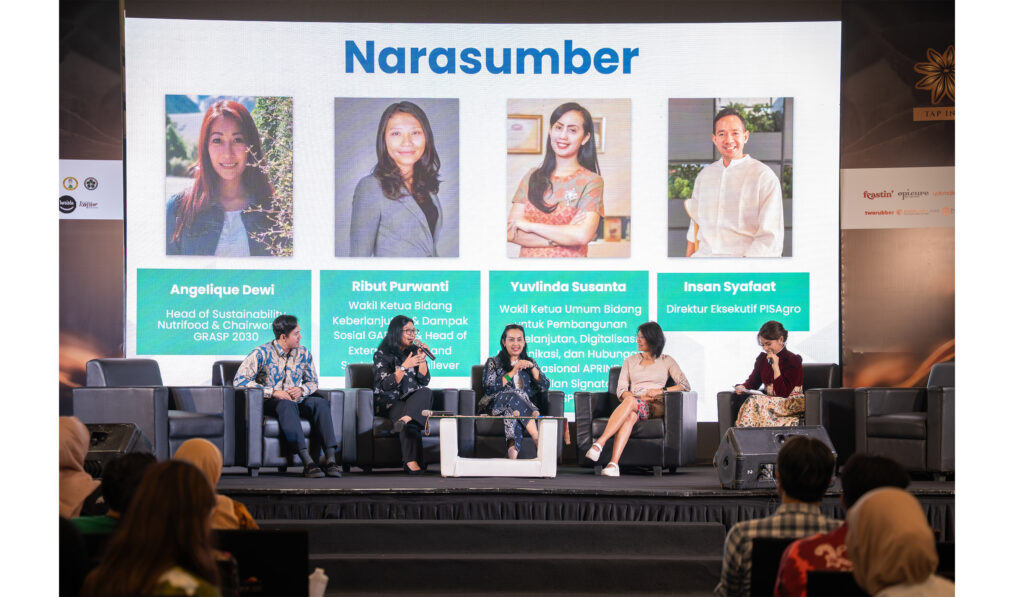
GRASP 2030 Tegaskan Komitmen Bisnis untuk Dorong Aksi Nyata Atasi Susut dan Sisa Pangan
Siaran Pers – Untuk Segera Diterbitkan
Dalam sesi khusus di Nusantara Food & Hotel 2025, IBCSD melalui GRASP 2030 memperkuat kolaborasi lintas sektor lewat penandatanganan MoU dengan APRINDO, GAPMMI, dan PISAgro, serta bergabungnya Unilever sebagai signatories baru. Acara ini menegaskan komitmen bersama untuk mendorong aksi nyata atasi susut dan sisa pangan.
Jakarta, 3 Juli 2025 — Indonesia Business Council for Sustainable Development (IBCSD), melalui inisiatif GRASP 2030 (Gotong Royong Atasi Susut dan Sisa Pangan di 2030), mengumpulkan para pemimpin bisnis, pemerintah, asosiasi, media, dan masyarakat umum dalam konferensi Nusantara Food & Hotel 2025 pada sebuah sesi khusus bertajuk “Mendorong Aksi Nyata untuk Mengatasi Susut dan Sisa Pangan.”
Sesi ini diisi dengan sambutan dari perwakilan BAPPENAS dan Bapanas yang menyampaikan pandangan dari sektor pemerintah. Pada kesempatan yang sama, dilakukan pula penandatanganan Nota Kesepahaman (MoU) antara IBCSD dan sejumlah asosiasi, yaitu Asosiasi Pengusaha Ritel Indonesia (APRINDO), Gabungan Produsen Makanan Minuman Indonesia (GAPMMI), dan PISAgro. Unilever juga secara resmi bergabung sebagai signatories GRASP 2030 melalui penandatanganan voluntary agreement. Selain itu, sesi ini dilengkapi dengan diskusi talkshow yang menjadi ruang berbagi pengalaman dan komitmen dari asosiasi dan signatories GRASP 2030 dalam mengatasi susut dan sisa pangan.
Acara dihadiri lebih dari 100 peserta dari berbagai sektor yang hadir untuk mewujudkan upaya bersama, dengan dukungan sejumlah signatories GRASP 2030, yakni Unilever, Nutrifood, Great Giant Food, dan Kalbe Nutritionals. Sebagai sebuah wadah kolaborasi multipihak, GRASP 2030 bersama dengan para signatories-nya terus berupaya untuk mendorong aksi nyata untuk mengatasi susut dan sisa pangan.
Indah Budiani, Direktur Eksekutif IBCSD, menyampaikan bahwa selain merugikan ekonomi dan lingkungan, susut dan sisa pangan juga mencerminkan ketimpangan sosial. “Oleh karena itu, komitmen bersama sektor bisnis dalam mengurangi susut dan sisa pangan bukan sekadar tanggung jawab sosial, tetapi juga peluang untuk efisiensi operasional, inovasi produk, dan peningkatan reputasi di mata konsumen, terutama generasi muda,” sebut Indah dalam sambutannya saat membuka acara.
Sesi ini juga menyoroti pentingnya peran pengurangan susut dan sisa pangan dalam memperkuat ketahanan pangan nasional. Dalam pidatonya, Nita Yulianis, Direktur Kewaspadaan Pangan BAPANAS, menekankan urgensi serta langkah utama untuk mengatasi susut dan sisa pangan di Indonesia, yang mencapai 48 juta ton per tahun. “Kami memahami bahwa banyak hal sudah dilakukan oleh Bapak Ibu sekalian, tetapi kita gaungkan kembali dengan tiga langkah utama: pencegahan timbulan sisa makanan, penanganan sisa pangan, dan pencatatan,” jelas Nita.
Dalam sesi talk show, para narasumber membahas tantangan dan upaya pengurangan susut dan sisa pangan di berbagai sektor, mulai dari sektor pertanian, produksi, hingga ritel,. GAPMMI menyoroti tantangan overproduksi akibat perubahan cepat preferensi konsumen; APRINDO menekankan pentingnya manajemen stok yang efektif di sektor ritel; sementara PISAgro membagikan pengalaman mendampingi petani agar memproduksi secara efisien dan menghindari susut pangan.
Chairwoman GRASP 2030 sekaligus Head of Sustainability Nutrifood, Angelique Dewi, mendorong pelaku usaha untuk mulai dari langkah sederhana seperti mengukur jumlah food waste di operasional mereka sebagai bentuk efisiensi. “Kita tidak perlu langsung berinovasi besar-besaran. Mulailah dengan mengukur food waste di operasional masing-masing. Ini adalah bentuk efisiensi bagi perusahaan itu sendiri, dan akan lebih efektif jika dilakukan dengan berkolaborasi bersama food bank dan pengelola sampah makanan,” ujarnya.
GRASP 2030 terus mengajak lebih banyak perusahaan dan organisasi lainnya untuk bergabung, menerapkan pendekatan Target–Ukur–Aksi, dan menjadikan pengurangan susut dan sisa pangan sebagai bagian dari strategi keberlanjutan. Sesi di Nusantara Food & Hotel 2025 menunjukkan bagaimana komitmen dapat diwujudkan dalam aksi nyata, sekaligus menjadi langkah penting menuju pencapaian target nasional di 2030. Lebih dari sekadar forum diskusi, acara ini mencerminkan gerakan kolektif yang kian kuat untuk membangun sistem pangan yang berkelanjutan.
Tentang IBCSD
Indonesia Business Council for Sustainable Development (IBCSD) adalah asosiasi yang dipimpin oleh para CEO perusahaan di Indonesia yang berkomitmen mendorong pembangunan berkelanjutan melalui pertumbuhan ekonomi, keseimbangan ekologi, dan kemajuan sosial. Sebagai partner global dari WBCSD, IBCSD memfasilitasi kepemimpinan bisnis berkelanjutan, mempromosikan praktik terbaik, dan bermitra dengan pemerintah serta masyarakat sipil untuk mendorong solusi kebijakan yang berdampak. Kunjungi ibcsd.or.id atau hubungi [email protected] untuk informasi lebih lanjut.
Tentang GRASP 2030
GRASP 2030 (Gotong Royong Atasi Susut dan Sisa Pangan di 2030) adalah perjanjian sukarela (voluntary agreement) yang diinisiasi oleh IBCSD untuk mengurangi setengah dari susut dan sisa pangan (SSP) di Indonesia pada tahun 2030. Diluncurkan pada 2021, GRASP 2030 menjadi platform kolaboratif tingkat nasional yang melibatkan sektor swasta, asosiasi, NGO, pemerintah, dan aktor lain di sepanjang rantai nilai pangan. Melalui pendekatan Target–Ukur–Aksi, inisiatif ini mendorong aksi terkoordinasi, berbagi praktik terbaik, dan inovasi untuk mewujudkan sistem pangan yang berkelanjutan.
Kontak Media
Nurina Izazi, Communications Manager IBCSD, [email protected]




